Being African: What does hair have to do with it?
- Published
The BBC's Pumza Fihlani looks at the politics around African hair
Hair has become a political issue across Africa. Chemical relaxers, which straighten hair, have been popular for years. But while the look is seen by some as professional, others call it un-African. There's a move away from relaxing hair - a journey the BBC's Pumza Fihlani has made.
Sundays were salon days when I was young. From the age of 10, my mother would plait or relax my hair for school.
She spent three hours on each of her three daughters' heads.
My middle sister has a sensitive scalp and was the first to rush for the wash basin.
She'd be crying funeral tears by the time she was done.
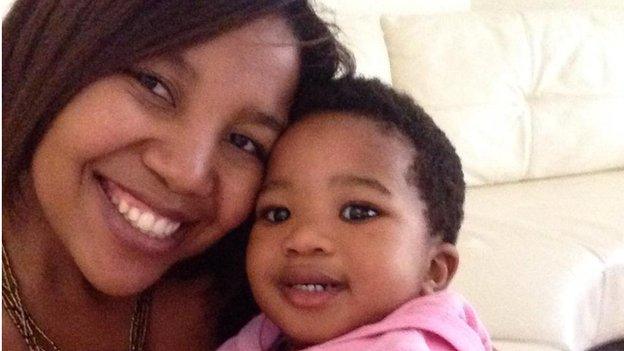
Although I've relaxed my hair for more than two decades, I will keep my daughter's hair natural for many years
The chemical sodium hydroxide is put on the hair to break down its protein causing it to become straight. This can be a painful process that sometimes leaves you with a burnt scalp.
Although African hair is versatile, with endless hairstyles to choose from, Africa has been flooded with relaxers to smooth that stubborn kink.
But people are starting to turn away from relaxers.
Nigerian author Chimamanda Ngozi Adichie has touched on some of the restrictions it brings.
"Relaxing your hair is like being in prison," she wrote. "You're caged in. Your hair rules you."
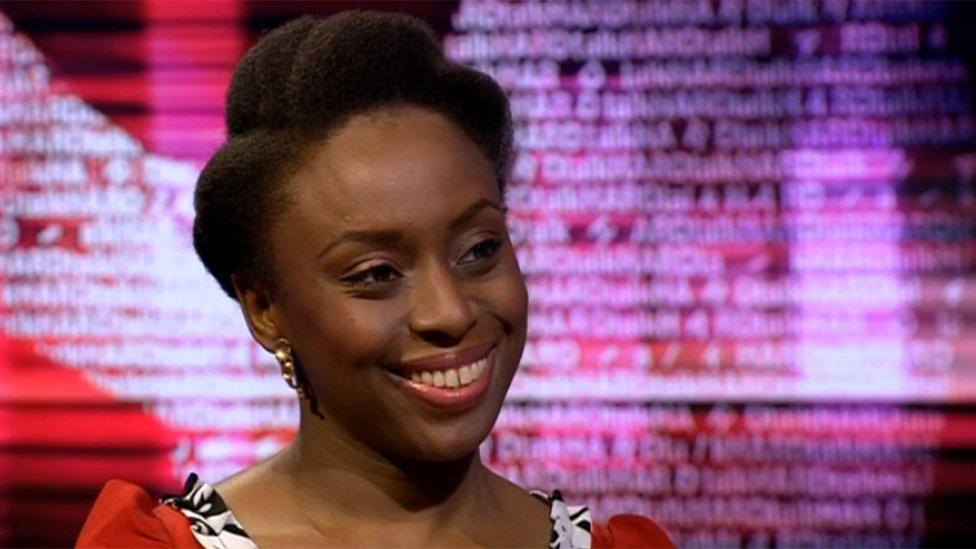
Author Chimamanda Ngozi Adichie says when you have relaxed hair, your hair rules you
"You're always battling to make your hair do what it wasn't meant to do."
Natural hair supporters go one step further - to say natural hair is a nod to being a real African.
South African hair blogger Milisuthando Bongela says black hair has been treated with disdain for years because black people have been made to be a problem.
For centuries black women around the world were discriminated against because of their skin, hair and culture. White attributes - including straight hair - were seen as superior.
There are still remnants of that to this day.
When a black woman graces our screens she is usually wearing either a weave or has bone-straight, relaxed hair.
Valley Fontaine breaks down the four main styles available to women with afro hair.
But believing that all women who relax their hair or wear weaves do so because they are trying to be white would be simplistic.
It doesn't take into consideration the social pressures.
Until recently many South African schools and work places favoured relaxed hair because other styles weren't seen as the "professional look".
Eyewitness News reported, external in 2014 that a 16-year-old girl from Cape Town was sent home from school for wearing thick braids.
Later in life, some women worry that they will be passed over for promotions and relationships if they keep their hair natural.
That's because there is still a stigma around natural hair. Its harshest critics consider it to be unkempt.
Even the Kenyan Oscar-winning actress Lupita Nyong'o told the BBC that when she decided to stop relaxing her hair and cut it all off, what grew back "wasn't that bad after all".
I don't ever recall my mother saying long straight hair made us prettier or making any of us feel our bushy natural hair was unsightly. For her, relaxing it meant less time getting us ready in the mornings.
It was simply convenient.
It takes time and effort to look after natural hair. Now I spend anything up to five hours in the salon, a twice-a-month ritual. Each visit can cost up to 1,500 rand ($120; £75), depending on what I get done.
Ms Adichie also points out that many people choose to relax their hair because they don't know how to care for natural hair.

'Education is needed on hair care'

"There's a perception that natural hair is unkempt hair. A bit of education needs to be done here. I know that natural hair can look neat too."
Fify Loewen is a photographer from Gaborone, Botswana.
See her pictures of her journey from relaxed to natural hair.

10 tips on how to transition from relaxed to natural hair without the big chop
To prevent breakage, use your fingers instead of a comb.
Choose styles that don't need to be changed daily to avoid breakage
Keep your hair well moisturised. The drier your hair, the more likely it is to break.
Keep your hair tips tucked away to prevent them from drying out
Trim off split ends or excessively dry ends
Trying to achieve the same styles that you did when your hair was relaxed will frustrate you . So create some new hairstyles
Avoid heat on your hair.
Use weaves, wigs and braid extensions with care. If fitted too tightly or worn for too long they can lead to hair breakage and traction alopecia
Many hair products will make unproven growth and strength claims, but scientific trials are yet to prove they do more than aid styling
A healthy diet extends to the health of your hair
by the BBC's Valley Fontaine, who blogs about, external maintaining natural hair

'Good hair'
For many years, I had below shoulder length hair. I'd often be stopped by strangers to ask what I use to grow it. Many would run fingers through it.
No-one likes this.
"Do you have white blood?" they'd ask.
"Are you Coloured [mixed race]?"
It seemed too far-fetched that a black woman can have "good hair" - a phrase used to mean it is long and healthy - unless there's a white relative in the family to help loosen our tight coils.
Hair is used in this way to categorise each other.
In apartheid South Africa when your race wasn't clear a pencil would be pushed through your hair. In the so-called pencil test, if the pencil fell to the floor, you would be considered white.
If it stuck, you would be considered "Coloured" (mixed race). In some cases, members of the same family were classified into different groups, and forced to live apart.
Breaking type
When I decided to cut my hair last December I felt like a major change. But I was also curious how people would react.
It became evident that a lot of people were more attached to my hair than I was.
I was told I was "ungrateful" because many struggle to grow their hair.
This shocked me.
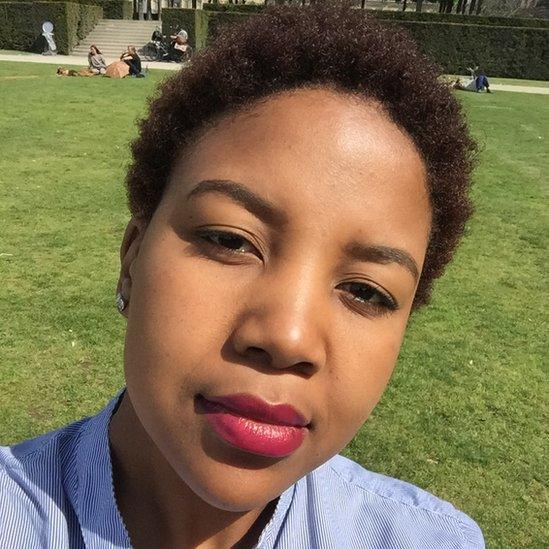
I am taking a relaxer break for an entire year to see how much I can grow it without chemicals
I would like to be seen as more than my hair.
I refuse to be reduced to a type because of my hair, boxed into the category of "beautiful because she has long hair", "successful because she has long hair", perhaps even "married because she has long hair".
And what is it about straightening my hair that communicates that I have abandoned my roots?
While I love my new hairstyle - I don't think I'm any more African now than I was before the chop.
As columnist Kuli Roberts says, "we need to stop putting black women in a box".
She has been scrutinised over her choice to wear weaves - questions that are never directed at people from other races.
Some say hair is one of the most contentious issues in black society.
South African columnist Danielle Bowler goes as far as to say in Eyewitness News that, external "while some women might not choose their hairstyle based on an overt political decision, the choices available to us are themselves inescapably political".
She also notes that hair can be divisive.
The debate is often "reduced to a simplistic antagonistic relationship between weaves and natural hair" she says.
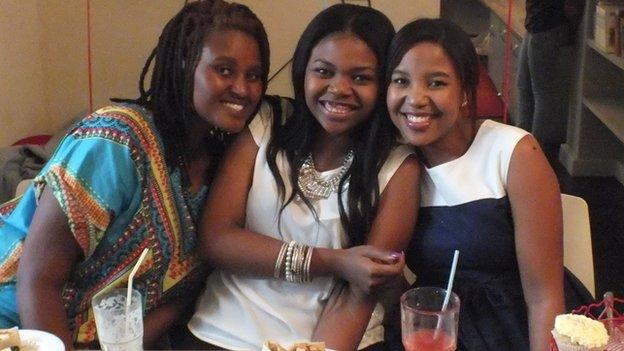
From dreadlocks, weaves and relaxed hair, my sisters and I wear our hair with pride
But African hair comes in many different textures - it is versatile and resilient.
It holds braided hairstyles like no other and we can adorn our crowns with these for weeks on end with endless options to choose from.
I look forward to the day when I can leave my hair wild and uncombed and have it say nothing else about me apart from "I didn't feel like combing my hair today".
Whether I weave it, relax it or braid it I'd like to live in a world where the choice of how to express myself - in hair and everything in between - is mine.
As for my sisters; the youngest now has long dreadlocks, my middle sister - who still isn't a fan of combing - rocks a weave most of the time and I have short, colour-treated afro hair.
We are the perfect representation of choice in modern South Africa - and in the end choice and the freedom to express it, is what those before us fought for.

More women on their hair choices

'Black hair cannot help but be political'
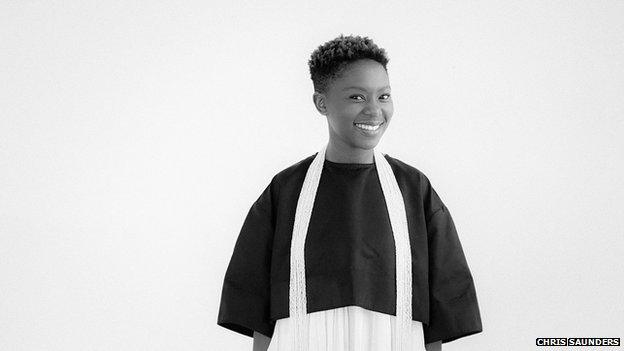
Milisuthando Bongela says a lot needs to be done to fight the stigma against natural hair around the world
"People generally love the way I wear my hair, I get compliments from people of all ages and races. I don't feel pressured to look a certain way anymore, but not everybody has this experience.
"Black hair has been treated with disdain for years because black people have been made to be a problem, fighting to get out of enslavement and oppression, fighting to get into mainstream society, fighting for equal rights. Black hair, which is what makes us black, has been fighting for those same rights.
"Our hair is great because it is adaptable and we have been embellishing and adding length to it and styling it in myriad ways for thousands of years, weaves didn't come with white people.
"But we have to create safe, non-judgemental, non-divisive spaces for us to talk to each other.
"I think the best approach is to reinvest natural black hair with positive qualities so that people don't feel the need to change their hair in order to be associated with things like beauty, sexiness, success, ambition and professionalism.
"All we can do as black people who accept our features and love them, is symbolically invest them with the good qualities that racism has taken away."
Milisuthando Bongela is a blogger in Johannesburg, South Africa

'I'm not trying to be white'
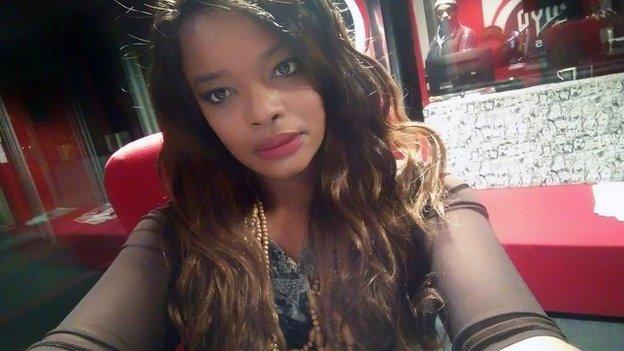
Kuli Roberts says her hair is only an accessory, it does not define her
"With our history it will always be about race but what people don't understand is that there are other races - and we need to stop this obsession with white people. The problem is we're placing white people on a pedestal - not every woman who wears a wig is trying to be white.
"There isn't a single thing that we do to our hair that white people don't, they colour it, they wear wigs, they straighten it - no-one ever accuses them of trying to be something else.
"The idea that when a black person wears a weave it's a sign of how insecure she is, is just ridiculous frankly. I have options. I treat my hair the same way I treat my nails, I can wear it in many different ways - that doesn't change who I am.
"I don't rely on my hair to make a statement about me, it doesn't determine my race. I know who I am. The idea that you have such low self-esteem that your hair is the one thing that defines you - come on.
"The debate about hair needs to happen but we mustn't let ourselves become part of some agenda outside of us. I will not take part in anything that seeks to berate black women for exercising their options.
"I've been insulted and told I look like a Barbie - but I don't ever entertain that.
"They don't do it to any other race, they do it to black women. How about we debate why Jewish women wear wigs? Why white women colour their hair? Why they wear braids - are they trying to be black?
"We need to stop putting black women in a box, society needs to evolve past that. Don't put me in a box."
Kuli Roberts is a columnist and socialite in Johannesburg, South Africa.

We want to hear your recipes for homemade hair treatments.
Fify Loewen makes a blend of banana, avocado, raw honey, olive oil and coconut oil.
She tried to buy commercial products, external for natural hair but she says they are hard to find in Botswana.
Tell us your recipes by commenting on Facebook, external or tweeting us, external using the hashtag #HairTalks.
- Published31 May 2015
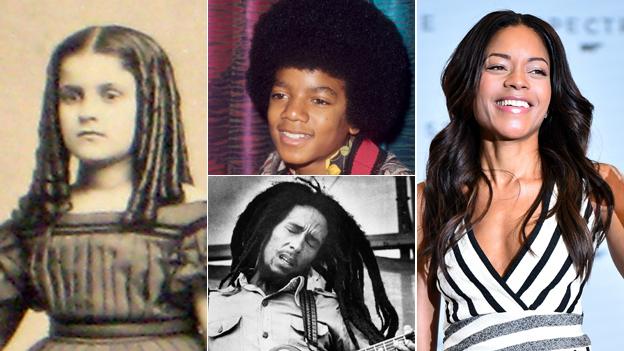
- Published7 March 2015
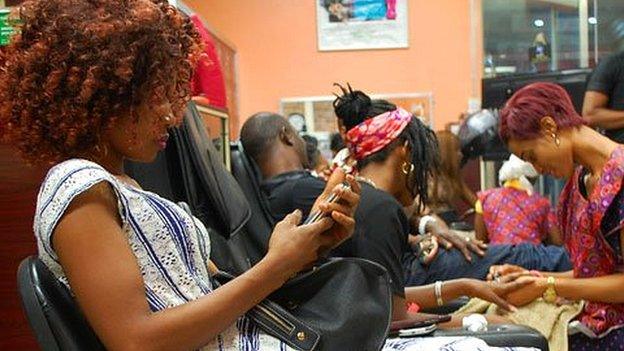
- Published26 November 2014
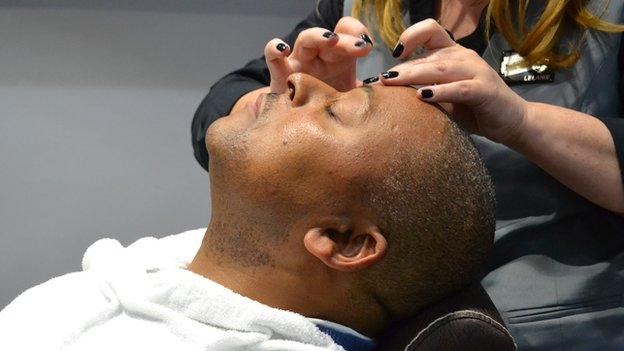
- Published1 January 2013
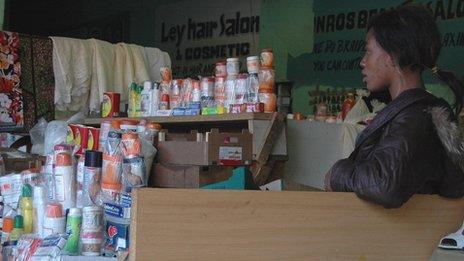
- Published9 July 2024
